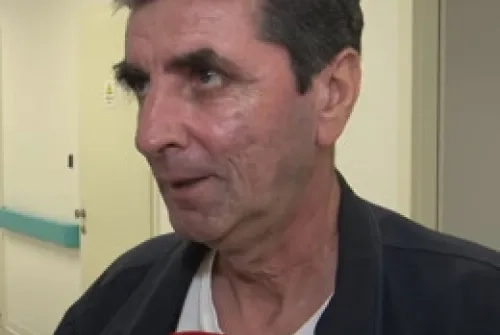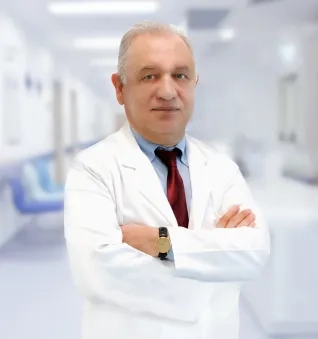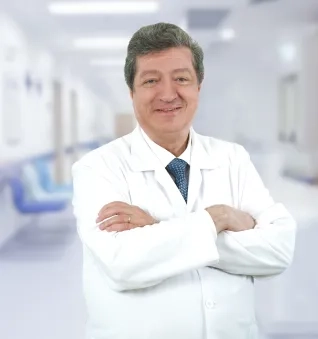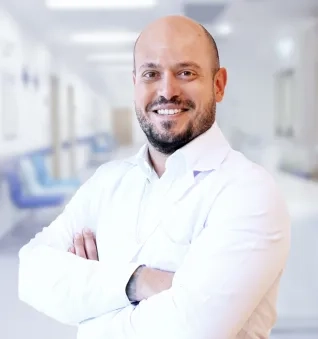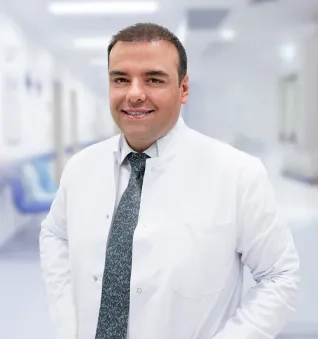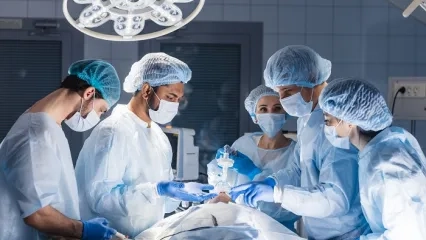Alo Yeditepe
Alo Yeditepe
He Came to Turkey to Get Rid of the Colostomy Bag
Cornel Sırbu, who lives in Romania, learned that he had colon cancer during a colonoscopy examination. During the operation performed, Sırbu's intestine was removed and connected to a "colostomy bag." Continuing his life with the "colostomy bag" and going through difficult days, Sırbu has got rid of the bag and regained his health through the operation performed in Turkey.
Cornel Sirbu, who lives in Romania and works as an engineer for a private company, had a colonoscopy for a routine checkup in 2017. During the operation, colon polyps were found in Sırbu's large intestine. The intestine of Cornel Sırbu, who had undergone surgery with a diagnosis of colon cancer, was removed from his body and connected to a "colostomy bag." Continuing his life with a "colostomy bag" for three years, Sırbu has experienced many disadvantages in both his work and social life. Cornel Sirbu, who immediately came to Türkiye after doctors in Romania said that the intestine could not be taken in, was almost reborn through the operation performed by Yeditepe University Koşuyolu Hospital General Surgery Specialist.
“I Had to Stay Confined at Home"
Pointing out that life with a "colostomy bag" is so difficult, Cornel Sırbu said, “My first diagnosis was made in 2017. During the checkups, several polyps were detected in the colon. The doctors decided on surgery. The part containing the polyp was removed through surgery. After the operation, a portion of the intestine was removed and connected to a bag. Then chemotherapy began. Living with this bag was affecting my life negatively. I couldn't go anywhere, I stayed confined at home. I have lived with this bag for 3 years. I ate less in order for the bag wouldn't fill up. It was also so difficult for me to attend meetings related to my work. When I realized that the situation was not going well, I decided to come to Turkey. Here, general surgery and oncology doctors initiated my treatment. When my body responded positively to chemotherapy, they decided to close the colostomy bag and take the intestine into the body. The surgery has been performed, and I feel good right now.”
Explaining that they have gone through a very difficult period, Emilia Sırbu, his wife, said, “The whole family was in shock when the diagnosis was first made. When he was entering the operation, no one told me "your wife will wake up with a bag." We were devastated when we saw the bag after the operation. Someone from the family had to care for my husband. I have undertaken the care of my husband. My husband could not devote much time to his work. We have had very difficult days.”
The Risk Increases As the Cancer Approaches the Rectum
Explaining the reason why such colon tumor surgeries end with a "colostomy bag," our specialist warned, “In colon cancers, the possibility of the surgery ending with a bag increases as the tumor approaches the rectum. The closer a tumor is to the rectum; the greater the patient's need for radiation therapy. Of the patients, 60 percent complete their lives with this bag because stoma closure surgery is not performed. But they should know that they don't have to live in this way. In suitable cases, the bags can be closed by applying special techniques."
Reminding that stoma closure surgeries are as risky as surgeries to open them, our specialist said, “There is a risk of losing the patient in 4 percent of surgeries for taking the intestine into the body. Therefore, it is necessary to avoid the bag as much as possible. If the operation has ended with a bag, it is important to refer the person to a good center after the treatment.”
Requires Special Surgery
"Closure of a colostomy may not be possible in every individual in whom it has been established. Some colostomies are permanent,” said Yeditepe University Hospital General Surgery Specialist, adding: “Sometimes, surgeons may also have difficulty closing colostomies that are established by necessity in non-cancerous colon diseases. It is also appropriate to send these patients to advanced centers. These surgeries are highly specialized operations that cannot be deemed easy."
Finally, drawing attention to colon cancers, our specialist said, “When polyps and the formations that are benign by 90 percent have cleared the risk of cancer is minimized. If diagnosed early, it can be treated successfully at a high rate. For this reason, everyone who has reached the age of 45 should have a screening colonoscopy. If everything is fine with the screening colonoscopy, the second scan should be 10 years later. Whether there is colon cancer in the family also plays a role in the frequency of colonoscopy.”
Press Coverage: haberler.com | mynet.com | cnnturk.com
This content was prepared by Yeditepe University Hospitals Medical Editorial Board.
”
See Also
- What is a Liver Transplant, How is it Done? and Who is it For?
- Does Secondhand Smoke Increase the Risk of Breast Cancer?
- What is Gallbladder Surgery?
- Colorectal Cancers and Treatment Methods
- Patched Solution for Umbilical Hernia
- What are the Symptoms and Treatment Methods of Cirrhosis?
- 10 Questions About Kidney Transplantation
- Breast Cancer Diagnosis and Treatment Methods
- Swallowable Gastric Balloon
- What Are the Symptoms of Gallbladder Stones? How Is It Treated?
- What is Cirrhosis? What Causes Cirrhosis
- Chronic Kidney Disease and Treatment Methods
- 3 Major Developments Shaping Treatment in Colon Cancer
- Can Weight Loss Despite Not Dieting Be a Sign of Cancer?
- The Biggest Obstacle to Early Diagnosis of Breast Cancer: LACK OF INFORMATION
- Serious Risk Factor for Colon Cancer: Heredity
- Breast Protective Surgery Is Not Recommended in the Treatment of Multifocal Breast Cancer
- Does Breast Cancer Risk Decrease During Pregnancy and Breastfeeding?
- Breast Cancer Incidence Age Is Decreasing Day by Day
- Early Detection Is Cancer's Most Powerful Enemy
- Breast Cancer Has Dethroned Lung Cancer for The First Time! But, Why?
- Emotional Stress May Affect Risk of Recurrence in Breast Cancer
- Although Her Fears Prevented Her from Going to the Hospital, She Managed to Beat Breast Cancer at the Age of 70
- Age of Breast Cancer Prevalence Falls, yet Mortality Declines
- Breast Cancer Screening Applications Decreased by 10% Before the Pandemic
- Facts About Breast Cancer
- Liver Cancer (Tumor) and Treatment
- Gallbladder Stones
- What Is Appendicitis?
- Hemorrhoid Treatment
- Questions About Gastroenterology Surgery
- Surgery for Breast Cancer and Breast Aesthetics Can Be Performed Simultaneously
- What are the Types of Obesity Surgeries?
- Questions About Obesity Surgery
- A New Era in Obesity Surgery
- Overweight
- Are Obesity Surgeries Risky?
- New Study Surprised: “Mortality Increased in Breast Cancer Cases Under the Age of 40”
Alo Yeditepe

